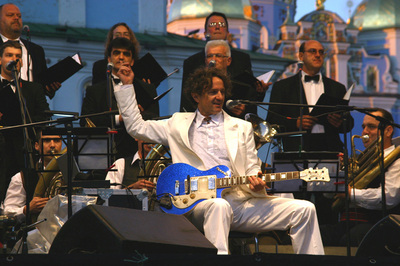Endlessly inventive Goran Bregovic bringing his Wedding & Funeral Orchestra to Hill Auditorium

Goran Bregovic and His Wedding and Funeral Orchestra
Reading about the group and listening to them did nothing to dissuade me from love at first look. Bregovic is the Sarajevo-born genius behind the score for Emir Kusturica’s “Time of the Gypsies” (as well as “Arizona Dreams” and “La Reine Margot”) and the founder of the rock group White Button. His Wedding and Funeral Orchestra mixes and matches the potent musics and powerful instruments that have shaped him along the way to the present: Gypsy brass bands, rock bands, Bulgarian polyphony, electric guitars, violins … the list goes on.
The group’s concert is set for Hill Saturday evening. I don’t know how people will stay in their seats, so much does the music urge you to your feet. Bregovic took time to answer questions posed by email—he said he wanted to polish his English more before doing live interviews. His answers are as communicative and articulate as his music.
PREVIEW
Goran Bregovic and his Wedding and Funeral Orchestra
- Who: Genre-crossing musician and band.
- What: An evening of music, drawn largely from Bregovic’s latest album, “Champagne for Gypsies,” blending everything from Gypsy brass band to string quartet and Bulgarian polyphony.
- Where: Hill Auditorium, 825 N. University Ave.
- When: Saturday, 8 p.m.
- How much: $10-$48. Tickets available from the ticket office in the Michigan League, 734-764-2538, and online at ums.org.
- Free event: Brown Bag Lecture: "Mountain Fairies to Fender Guitars: The Power of Myth in the Music and Times of Goran Bregovic," Wednesday, Oct. 12, noon, U-M School of Social Work, 1636 International Institute.
I shall come with my big band, the Wedding and Funeral Orchestra, which gives me an opportunity to present a large variety of my music. There will be 19 musicians on stage: a sextet of male voices, a string quartet plus my soloists: 5 brass players, two Bulgarian voices, a singer/drummer, plus myself. You will hear songs from my new album “Champagne for Gypsies,” and from the previous album “Sljivovica.” Also pieces from my opera “Karmen with a Happy End” and some older favorites... But I shall also perform some parts of my lay liturgy “My Heart has become tolerant,” and from my newest piece “Margot, memoires of an unhappy queen.”
Brass bands started as military bands, but being in the hands of Gypsies, they soon started playing at weddings, for dancing. They also played at funerals, as it is a custom here that at the funeral the deceased should have the music he liked in his lifetime. So in essence funerals and weddings here are not as different as they are in other parts of the world. Since some of my musicians—a great mix of classically trained and traditional players—used to play Weddings and Funerals, I started calling the band that name for fun and then it stuck….
How has your work in film and with White Button influenced your current style?
My current style is a logical continuation of the music I composed for my rock group “White Button” and for film-tracks. I was always impressed by traditional music. At 15, I played traditional music as a professional musician. The success of my rock group “White Button” was so great precisely because my music was always inspired by traditional music and the inevitable Gypsies.
When Emir Kusturica asked me to compose the soundtrack for "Time of the Gypsies" in the late '80s, I was the biggest rock-star in our country. This first film was an off-chance collaboration, and then I carried on because when the war broke out I was in Paris, and so was Emir, and that is all we could do there to earn money.
In a way, one could say that I've always played the same music, only once I wore diapers and now I just wear my ordinary clothes.
How much of what we will hear is original material or material that you have composed or arranged? What is the influence of traditional musics —Roma, Eastern European, Orthodox, etc., in your music? How about rock 'n' roll?
Like most composers in the history of music I have always been, and forever will be, inspired by tradition. Who isn’t? That was always the most natural method. From Stravinsky to Bartok, from Bizet to Lennon. Because tradition is like a solid bank from which you borrow in faith that you will return the loan with an interest.
I can’t imagine a performance of yours where I wouldn’t want to get up and dance—do audiences always want to join in when you perform? And do the performances include both music of mourning as well as joy, as the band’s title suggests?
The Balkans in general and my country in particular have all through their history oscillated between cycles of wild enthusiasm and profound depression—we are very good at both. And oddly, in the Balkans there is a word that is not translatable into other languages—“sevdah”—this word describes a state of abandoning oneself to the feeling, and it applies both to sad, dark feelings and to feelings of joy. One could maybe say that the Balkan people just have a way of making an easy contact with their feelings. This seems to transpire through my music—the soul recognizes it instinctively and the body greets it with an irresistible urge to dance.

